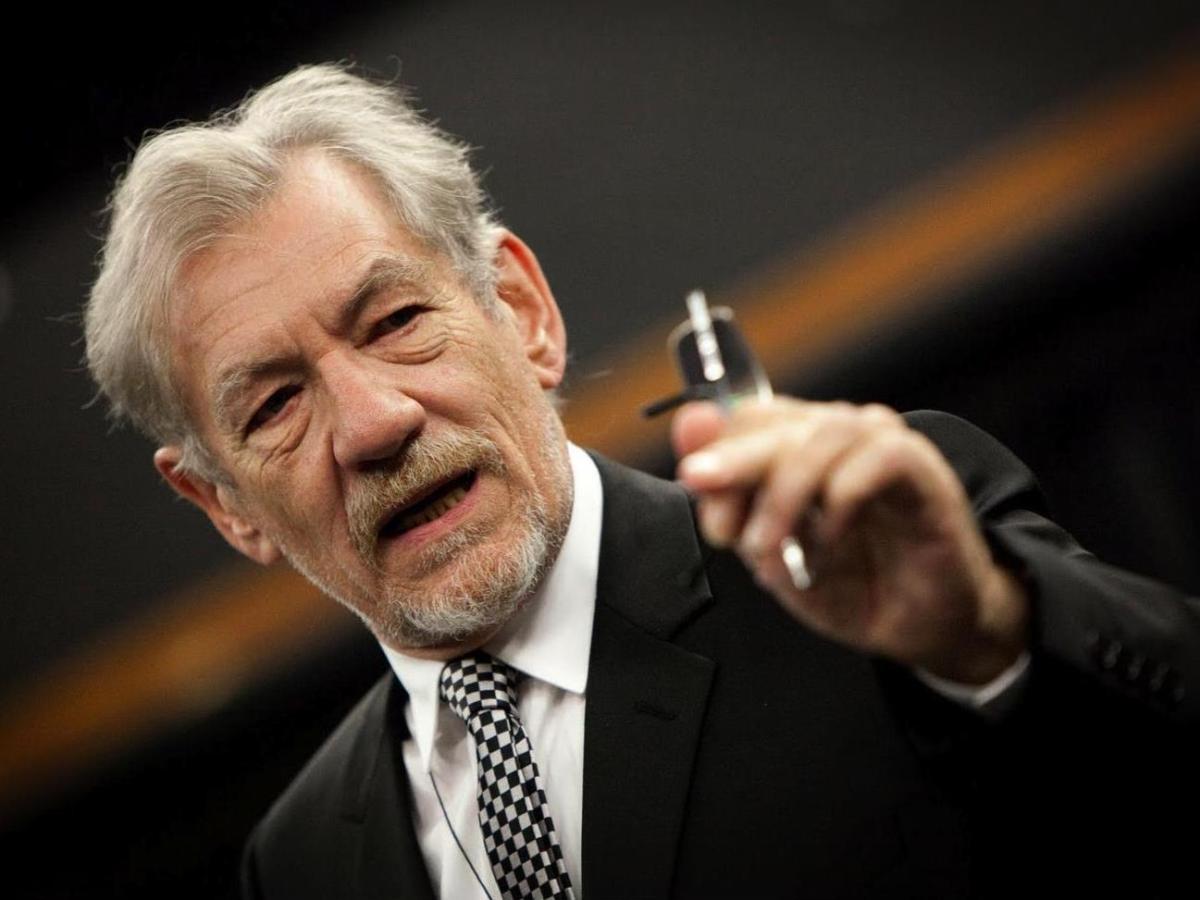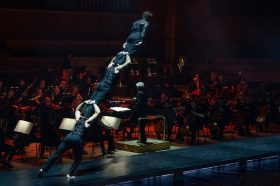Sir Ian McKellen: image via missjonespa.com
It’s generally accepted, at least in the film and television industry, that being open about one’s homosexuality is detrimental to one’s career. As gay British actor Rupert Everett said in a 2009 interview with The Observer: ‘It’s not that advisable to be honest. It’s not very easy. And, honestly, I would not advise any actor necessarily, if he was really thinking of his career, to come out.’
But what if the accepted wisdom is wrong?
‘I think unequivocally, coming out makes [people] much better artists,’ says Brett Sheehy, Artistic Director of the Melbourne Theatre Company (MTC). ‘Unequivocally. And indeed, artists who have come out, in my view – the change in their work from that moment is palpably better and more extraordinary.’
There’s a simple reason why coming out as queer can make someone better at their craft, and that’s because of the enormous amount of mental energy that a life in the closet consumes.
As clinical psychologist Dr Marcus Squirrell explains, ‘It’s typically something that the person has deliberately concealed from others, sometimes for many years, and for some people it can be a cathartic experience being able to actually be more honest and truthful about themselves and who they are – because a lot of energy is taken up through concealing one’s identity, so coming out can come as an enormous relief to people, and a release.
‘A lot of the clients I see often suffer from generalised anxiety conditions or persistent depression as a result of what they’re trying to conceal, and they don’t feel particularly integrated within themselves. So being out and being more authentic has got the potential to improve their mental health and therefore often improve function, concentration, the ability just to be present in the moment,’ Squirrell says.
Which is not to say that anyone should feel compelled to come out, or guilty that they’re still in the closet.
As performance artist Moira Finucane, the co-Artistic Director of Finucane & Smith, says, it’s a complex issue. ‘I am not that famous; I don’t have huge numbers of stakeholders in my career or my life as an artist. And there are different and deeper pressures, those close to one, family, loved ones, myriad expectations and family backgrounds that can put unimagined pressure on a person to be one thing or another. And there is the right to privacy; I personally don’t feel I owe the world my private life, even though I do feel I owe it to myself to stand up for what I think is right.
‘And I guess that’s a pivotal issue for me; so often the pressure is on the discriminated to be brave, to be courageous, to come out, to risk discrimination – and consequences none of us can fully understand – in their personal and professional life,’ she continues.
‘But what I do know for myself is that feeling like one can be oneself, own ones emotions and opinions and love and family, speak the truth as one sees it, even when it challenges the status quo, is liberating. It’s hard, but it’s liberating. It helps me feel whole and undiminished in a discriminating unequal world … And yes that helps me creatively; immensely. I also know that I am inspired, encouraged, supported when others speak up against discrimination, be it against themselves or others.
‘So for me the question is not whether an artist should come out, but what each and every one of us could and should do every single day, every time we hear the casual discrimination that floats around like ugly dust particles in an ugly sunlight to stop, to point it out, to change the rules, so it’s not a question that we have to ask in the future. We should all come out as anti-discrimination. It will help all our careers and all our creativity,’ Finucane says.
Sadly, one of the significant factors preventing lesbian, gay, bisexual and transgender (LGBT) artists from coming out seems to be the very industry that’s supposed to support performers in their professional careers.
Daniel Clarke, the CEO/Creative Producer of Theatre Works, came face to face with this entrenched homophobia 10 years ago.
‘When I finished drama school, I remember really distinctly talking with a casting agent who I’d known for a very long time, and she was like “You can’t let them know that you’re gay,” in terms of doing a to-camera for an audition when you introduce yourself. She said “You have to make sure they don’t pick up that you’re gay”. So I did the whole “Hi, I’m Dan” thing, and afterwards she asked “What’s happened? What’s going on? None of your personality is there any more,”’ Clarke says.
‘It was full on, because I was like, “You’ve just told me to be really anxious of how I’m speaking to whoever is going to see this audition; it’s an intro, it’s me as myself talking and you’ve just told me to be really aware of that.”
‘If we as an industry could create the space and the openness for people to come out if they choose to, that would be a good thing. The institutions and the casting directors and the people who make the decisions – there’s potentially got to be a shift there.’
Actor Ash Flanders agrees. ‘I’ve never had someone expressly say [I should stay in the closet] to my face, but I think it’s such an insidious, homophobic attitude that you don’t need someone to actively tell it to your face,’ he says.
‘I had an agent once tell me that when they were working in an agency, and I’d sent my stuff into them – and I spoke about this in my show Negative Energy – that the head of the agency, who was in charge of whether they wanted to meet with me or not, looked at my headshot and asked point blank if I was gay. And when this other agent said “Yes, he is,” the senior agent said “not interested”.
‘So, yes, I’ve been very aware that being an out actor can definitely hinder your career. But I’ve always looked at it like, it depends what game you’re playing. If you’re playing the game that you just want to be someone like a big-budget action movie star like Tom Cruise, you probably, if you were gay, should stay closeted, because that’s the way that machine operates, if that’s what you’re willing to do to work inside that machine.
‘But I would rather try and change the machine in some way, even if it’s just a small way, and be who I am … I wouldn’t want to be successful but not really be present in my own career, if you know what I mean? I never really understand the idea of having people think you’re great when you’re hiding so much of yourself, because they don’t really know you then. And if art is about communicating and I’m there to tell stories, I want to be present and fully there to be able to tell those stories. That’s my job as a performer,’ Flanders says.
According to Brett Sheehy, our theatrical institutions and agencies are being over-cautious.
‘My view is, happily, that the institutions are presuming a prejudice the audiences don’t have. But it’s the institutions that need to change … With gay marriage now, 60-70% of the nation is saying “we’re cool with this, we want this,” but the institution, government, is saying we’re not ready for it,’ he says.
‘But yes, the closet can absolutely damage careers. I know for a fact – and I don’t want to name names … but I know for a fact there are gay male actors who have gone to Hollywood or Los Angeles and been told “Be very quiet about your sexuality because it will harm your career”. My instinct is it did damage Rupert Everett’s career, that he was offered fewer roles after coming out.
‘Ian McKellen is the great benchmark. It hasn’t hurt his career, but I think if you sat down with Ian he would tell you that there was a period of five or 10 years where it was tricky for him.
‘We did Dance of Death in Sydney Festival in 2003, and Ian was starring in that years after he’d come out as a gay man, and I got to have a chat to him about that; and he absolutely supported your first premise, that coming out so made him a better artist and a better performer. And now the work he’s doing is just stellar. He’s one of the greatest actors of all time, and by his own admission, he would probably say “that wasn’t me before I came out”,’ Sheehy concluded.
The final word on the subject goes to McKellen himself, who wrote: ‘I learned that coming out was crucial to self-esteem. And I accepted the argument that people who thrived in society’s mainstream and had access to the media could, by telling the truth, help others in the backwaters whose views were never sought and whom society either ignored or abused.
‘An actor is more protected than most. These days I daily make this point to anyone who will listen because, when I eventually accepted it on the BBC, it changed my life forever for the better.’



_Encounters-in-Reflection_Gallery3BPhoto-by-Anpis-Wang-e1745414770771.jpg?w=280)

